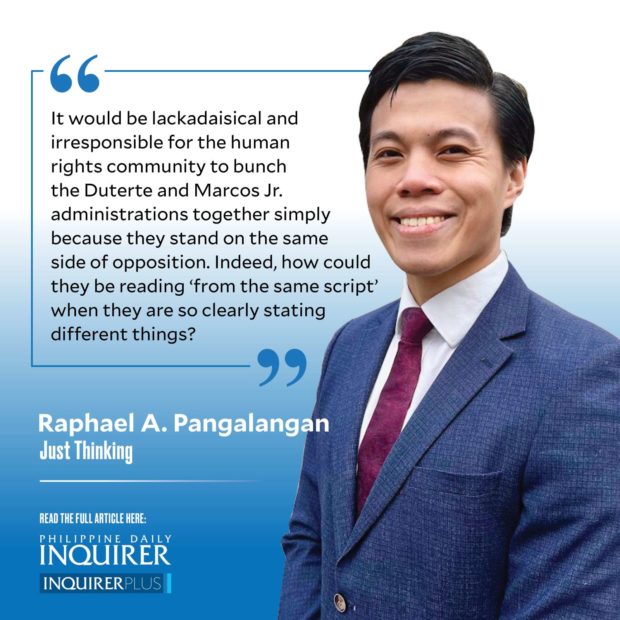Human rights: Not just legal mumbo jumbo
There once was a time when human rights were all too easily dismissed as legal gobbledygook. As lofty aspiration masquerading as law. A system that, though meaningful in intention, was simply meaningless in fact.
Jeremy Bentham—the English philosopher best known for his ethical theory of happiness (utilitarianism)—would have scoffed at our declarations and our treaties today. Yet neither do we Filipinos need to reach so far back into history. While 18th-century England had Bentham, 21st-century Philippines has Rodrigo Duterte. And what Bentham would describe as “nonsense upon stilts,” our former president would put much more elegantly. In true Duterte-speak, he has crassly dismissed human rights on more than one occasion as, well, “Bullshit!”
Article continues after this advertisementTo the untrained eye, it would seem that the Marcos Jr. administration is no different from its predecessor. That both Duterte and President Marcos Jr. are reading from the same script. That view is mistaken.
Last week, the Philippine delegation to the Universal Periodic Review, led by Justice Secretary Jesus Crispin Remulla, denied allegations of human rights violations in our country. Remulla rebuts that what the world may see as human rights violations is, for the Philippines, human rights compliance. If one man’s trash is another man’s treasure, then what is “necessary for a democratic society” all depends on who you’re asking.
Even the law on human rights has not escaped the clutches of relativism, and Remulla draws the normative line of subjectivity between the East and West. He claims that the naysayer states are “rich European nations” big on individual rights but “have no notion of community rights.” But unlike “Western countries where human rights [are] an individual matter,” “in the Philippines it is a community-based belief.”
Article continues after this advertisementThe individualist vs. communitarian debate is nothing new and was at its highest as a political ideology in the 1990s with the backing of the likes of Malaysia’s Mahathir Mohamad and Singapore’s Lee Kuan Yew. Also, commonly referred to as the “Asian values” debate, its proponents argue that what international law celebrates as “universal norm” is in truth an imposition of Western conventions and, thus, Western control.
To Remulla’s credit, the argument he advances should not be wholly dismissed. Indeed, we must stay alive to the potentials if not propensities of international law to be co-opted as a neocolonial tool. Yet in that same breath, neither can the Philippines hide behind legal relativisms. Indeed, the Asian values debate is a flimsy excuse for Philippine violations of UN-recognized norms for several reasons.
First of all, the Philippines of all Asian nations has had quite an active role in shaping UN human rights standards. In 1948, the Philippines led the drafting of the Universal Declaration of Human Rights and, by the end of the year, was one of only 48 states that voted to formally adopt the UDHR. Our delegation took the floor and claimed that it was that “very moment that [the UN] had justified its existence.”
The Philippines would continue its place at the forefront of the human rights project as the first Southeast Asian nation to sign both the International Covenant on Civil and Political Rights and the International Covenant on Economic, Social and Cultural Rights. To this day, the Philippines is one of the few countries that have ratified all seven core UN human rights treaties.
Second, neither may the Philippines so easily disavow the international condemnation of the drug war as a Western concoction when domestic law itself criminalizes extrajudicial killings (EJKs). The provisions of the Revised Penal Code on murder and Republic Act No. 9851 (the Philippine Act on Crimes Against International Humanitarian Law, Genocide, and Other Crimes Against Humanity) both squarely provide legal ground to prosecute the killings in the war on drugs.
And third, the normative East-West divide is largely overstated. Western states celebrate group rights, and even Asian states, such as the Philippines, have emphasized individual rights over social rights. Indeed, in my dissertation published with the esteemed Foundation for Liberty and Prosperity—an intellectual home for legal scholars founded by the venerated Chief Justice Artemio V. Panganiban—I illustrate how the 1987 Constitution itself prioritizes purported “Western” individualism and how it is only through statutes and jurisprudence that Philippine legal order was expanded to embrace communitarian protections.
In so many words, Remulla’s invocation of Asian values is not only about three decades late, but is rebutted by no other than the Philippine legal order itself. Still, I must admit, this level of argumentation is a breath of fresh air from that which preceded it. While the Duterte administration bluntly dismissed human rights outright, the Marcos Jr. administration shows its capacity to engage in a much more nuanced debate. Indeed, while Duterte refused to cooperate with the UN special rapporteur on EJKs, the Marcos Jr. administration has invited three special rapporteurs to visit our country.
By invoking Asian values, the Marcos Jr. administration admits that human rights are not justice nonsense on stilts. That it is more than legal mumbo jumbo. Different from Duterte, what is now put into question is not the concept but the content of human rights norms.
It would be lackadaisical and irresponsible for the human rights community to bunch the Duterte and Marcos Jr. administrations together simply because they stand on the same side of opposition. Indeed, how could they be reading “from the same script” when they are so clearly stating different things?
——————
thinkjustly@gmail.com

















